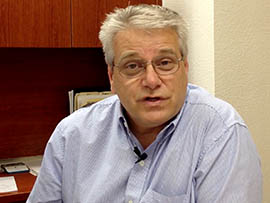Cronkite News has moved to a new home at cronkitenews.azpbs.org. Use this site to search archives from 2011 to May 2015. You can search the new site for current stories.
With navigator grants, groups spread word about health law options
PHOENIX – Her staff fielding questions in Spanish, Emma Torres explains by phone how Campesinos Sin Fronteras will spread the word about the Affordable Care Act in Yuma County.
“To reach the farmworkers we need to be up at 3 a.m. and meet them where they are, even if they are on the buses to the fields, on their breaks or on their lunches,” Torres said.
Campesinos Sin Fronteras, or Farmworkers Without Borders, was one of four organizations receiving federal navigator grants to assist underserved populations with health insurance choices available to Arizonans through a federal exchange.
Using its grant of $71,000, Torres’ organization will expand beyond its normal mission of connecting Yuma County residents with medical care and other services.
“The navigator grant allows us to get the training to become experts to be able to assist the underserved, the population that always seems to be left behind,” she said.
An estimated 1 million Arizonans lack health insurance.
When Gov. Jan Brewer chose to participate in the federal health care exchange rather than organizing a state-run exchange, Arizona became eligible for funds to train navigators to provide in-person education or enrollment assistance.
The U.S. Department of Health and Human Services awarded a total of $2.1 million in navigator grants. That effort will complement outreach by federally qualified community health centers in Arizona, working with a separate $2.3 million HHS grant.
Open enrollment, during which individuals can enroll in the insurance plan of their choice, begins Oct. 1 and ends March 31.
Health exchanges will offer coverage to all Arizonans, including those who previously couldn’t afford insurance or who have pre-existing conditions such as cancer.
Though a federal 24/7 hour hotline and website are up and running, many in underserved communities lack access to computers or struggle with English as their first language, said Allen Gjersvig, health care innovation director for the Arizona Association for Community Health Centers, which received a $1.34 million grant.
“The navigator grants help fill the gap for those that need extra help,” he said.
Gersvig said his organization will tap into its existing network of groups, some already working with Medicaid recipients and other underserved groups at 202 service sites statewide, including libraries.
Navigators will take 20 hours of online training and take a certification exam. When necessary, they will refer consumers to a health insurance ombudsman or programs offering help such as advice for those who think they can’t afford coverage.
Navigator grants also went to the Greater Phoenix Urban League ($524,000) and the University of Arizona’s Center for Rural Health ($190,000).
George Dean, president and CEO of the Greater Phoenix Urban League, said his organization plans to assist residents of Maricopa, Pima and Pinal counties.
“Having navigators to help with insurance-option awareness and education is a natural extension of how we serve the low-income, black, brown and Native American communities,” he said.
Howard Eng, grant administrator for the UA’s Center for Rural Health, said his organization will focus on Pima County’s Asian/Pacific Islander population, shown by 2010 Census to be Arizona’s fastest-growing minority population in percentage terms, numbering almost 250,000.
Eng said one navigator role is ensuring appropriate cultural and linguistic translations of federal information.
“It’s important not to reinvent the wheel, but we need to make sure the translation is correct,” he said.







